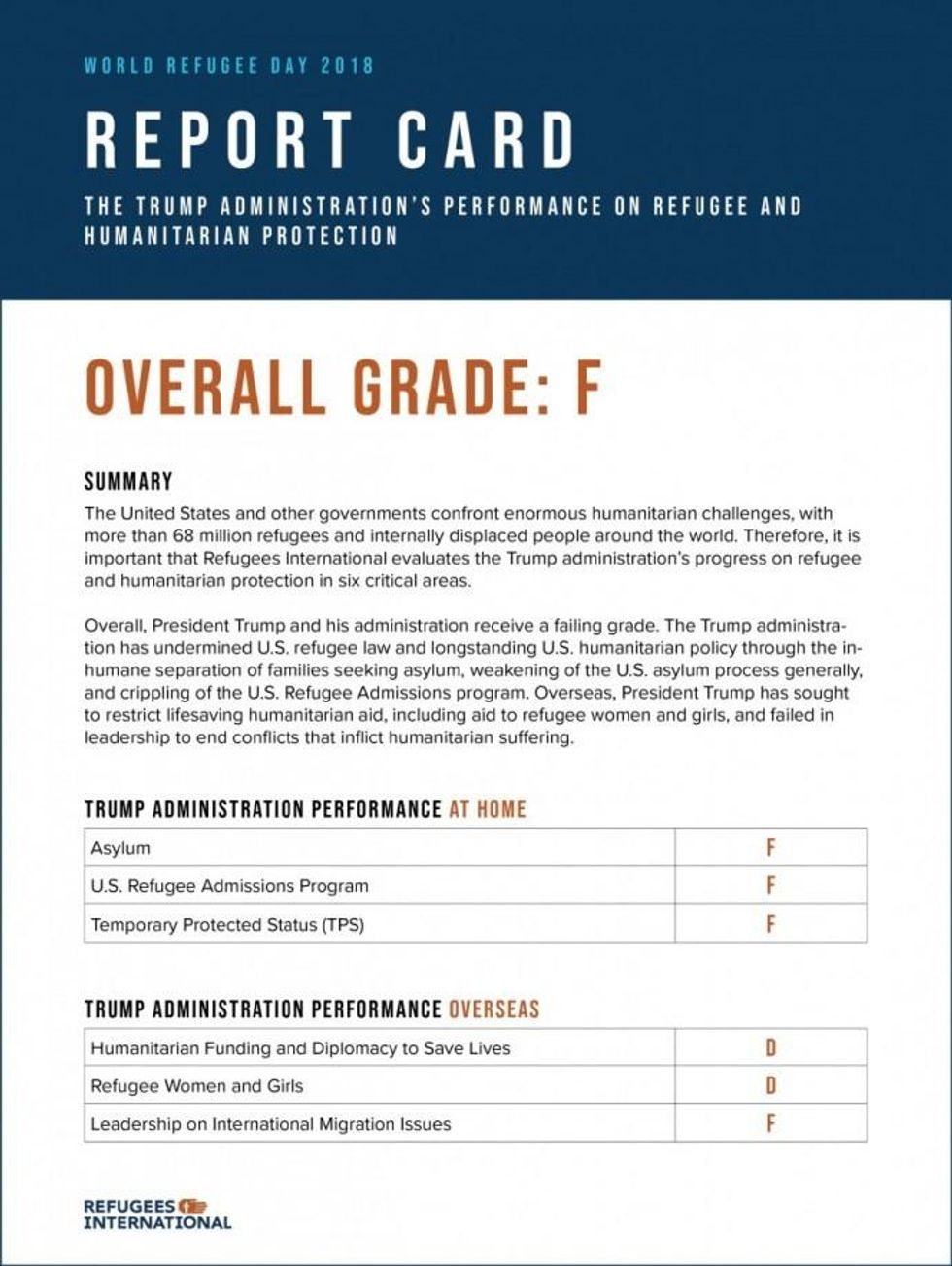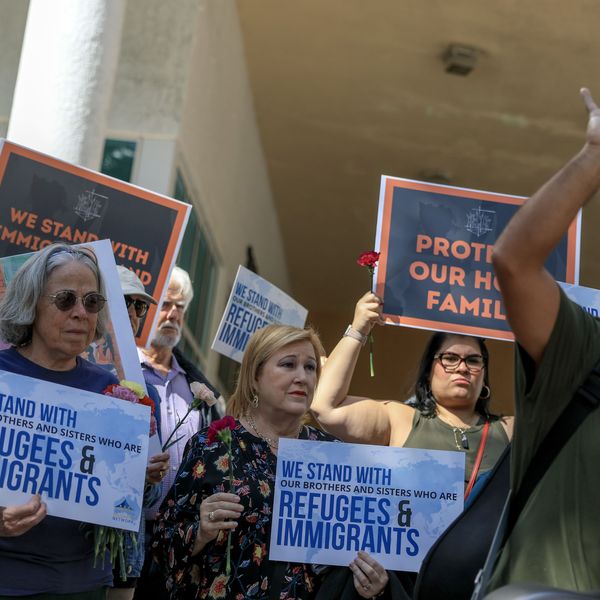
Humanitarian organization Refugees International has given the Trump administration an overall F for how it's done on refugee protection.
On World Refugee Day, Trump Gets Big Fat "F" for Treatment of World's Displaced and Persecuted
Among other failures, assessment from Refugees International notes administration's "inhumane separation of children from parents who are seeking asylum"
As the international community marks World Refugee Day on Wednesday, a new report card offers a scathing--though unsurprising--assessment of how the Trump administration's doing in terms of refugee and humanitarian protection, assigning it an F.
The performance review from the Washington, D.C.-based humanitarian organization Refugees International (RI) covers six areas. Three take a look at how the administration is doing domestically--regarding the issues of asylum, the U.S. Refugee Admissions Program, and Temporary Protected Status. The other three cover how the administration is doing abroad--specifically regarding humanitarian funding and diplomacy to save lives, efforts focused on refugee women and girls, and overall leadership on international migration issues.
While the administration scraped by with Ds for the categories of humanitarian funding and refugee women and girls, it failed the other four, giving it an overall grade of F.
"The challenges confronting refugees and displaced persons around the world are the greatest I have ever witnessed in decades of work on human rights and refugee issues," commented RI president Eric Schwartz, who noted that there are nearly 70 million people uprooted from their homes across the globe.
That displacement, he continued, comes "at a time in which governments are becoming increasingly restrictive in their treatment of refugees and displaced persons, including, regrettably, the government of the United States."
"Our situation at the southwest border is really horrendous--the inhumane separation of children from parents who are seeking asylum in violation of basic decency as well as U.S. commitments to international humanitarian principles," he noted.
In addition to that policy, the report card also notes with concern the new Justice Department guidance which "put[s] at risk the lives of thousands of women who seek to escape domestic and gang violence."
Detailing other diminished protections, the report card singles out:
the dramatic weakening of the U.S. political asylum process generally, the crippling of the U.S. Refugee Admissions program, and the disregard of humanitarian imperatives in the application of Temporary Protected Status. In humanitarian activities overseas, President Trump has sought to roll back U.S. leadership in financial support for lifesaving assistance based on need, imposed policies that adversely impact women and girls, and failed to assert leadership in efforts to end conflicts that continue to inflict horrific humanitarian suffering.

"Now, more than ever," he continued, "taking care of refugees must be a global--and shared--responsibility. It's time to do things differently."
That perspective on refugees was echoed by Amnesty International.
"Here in the U.S., we should be welcoming them into our communities with open arms and inviting them to our table, not building taller walls and implementing draconian policies meant to keep refugees and asylum seekers out," said Ryan Mace, grassroots advocacy and refugee specialist for the human rights organization.
An Urgent Message From Our Co-Founder
Dear Common Dreams reader, The U.S. is on a fast track to authoritarianism like nothing I've ever seen. Meanwhile, corporate news outlets are utterly capitulating to Trump, twisting their coverage to avoid drawing his ire while lining up to stuff cash in his pockets. That's why I believe that Common Dreams is doing the best and most consequential reporting that we've ever done. Our small but mighty team is a progressive reporting powerhouse, covering the news every day that the corporate media never will. Our mission has always been simple: To inform. To inspire. And to ignite change for the common good. Now here's the key piece that I want all our readers to understand: None of this would be possible without your financial support. That's not just some fundraising cliche. It's the absolute and literal truth. We don't accept corporate advertising and never will. We don't have a paywall because we don't think people should be blocked from critical news based on their ability to pay. Everything we do is funded by the donations of readers like you. Will you donate now to help power the nonprofit, independent reporting of Common Dreams? Thank you for being a vital member of our community. Together, we can keep independent journalism alive when it’s needed most. - Craig Brown, Co-founder |
As the international community marks World Refugee Day on Wednesday, a new report card offers a scathing--though unsurprising--assessment of how the Trump administration's doing in terms of refugee and humanitarian protection, assigning it an F.
The performance review from the Washington, D.C.-based humanitarian organization Refugees International (RI) covers six areas. Three take a look at how the administration is doing domestically--regarding the issues of asylum, the U.S. Refugee Admissions Program, and Temporary Protected Status. The other three cover how the administration is doing abroad--specifically regarding humanitarian funding and diplomacy to save lives, efforts focused on refugee women and girls, and overall leadership on international migration issues.
While the administration scraped by with Ds for the categories of humanitarian funding and refugee women and girls, it failed the other four, giving it an overall grade of F.
"The challenges confronting refugees and displaced persons around the world are the greatest I have ever witnessed in decades of work on human rights and refugee issues," commented RI president Eric Schwartz, who noted that there are nearly 70 million people uprooted from their homes across the globe.
That displacement, he continued, comes "at a time in which governments are becoming increasingly restrictive in their treatment of refugees and displaced persons, including, regrettably, the government of the United States."
"Our situation at the southwest border is really horrendous--the inhumane separation of children from parents who are seeking asylum in violation of basic decency as well as U.S. commitments to international humanitarian principles," he noted.
In addition to that policy, the report card also notes with concern the new Justice Department guidance which "put[s] at risk the lives of thousands of women who seek to escape domestic and gang violence."
Detailing other diminished protections, the report card singles out:
the dramatic weakening of the U.S. political asylum process generally, the crippling of the U.S. Refugee Admissions program, and the disregard of humanitarian imperatives in the application of Temporary Protected Status. In humanitarian activities overseas, President Trump has sought to roll back U.S. leadership in financial support for lifesaving assistance based on need, imposed policies that adversely impact women and girls, and failed to assert leadership in efforts to end conflicts that continue to inflict horrific humanitarian suffering.

"Now, more than ever," he continued, "taking care of refugees must be a global--and shared--responsibility. It's time to do things differently."
That perspective on refugees was echoed by Amnesty International.
"Here in the U.S., we should be welcoming them into our communities with open arms and inviting them to our table, not building taller walls and implementing draconian policies meant to keep refugees and asylum seekers out," said Ryan Mace, grassroots advocacy and refugee specialist for the human rights organization.
As the international community marks World Refugee Day on Wednesday, a new report card offers a scathing--though unsurprising--assessment of how the Trump administration's doing in terms of refugee and humanitarian protection, assigning it an F.
The performance review from the Washington, D.C.-based humanitarian organization Refugees International (RI) covers six areas. Three take a look at how the administration is doing domestically--regarding the issues of asylum, the U.S. Refugee Admissions Program, and Temporary Protected Status. The other three cover how the administration is doing abroad--specifically regarding humanitarian funding and diplomacy to save lives, efforts focused on refugee women and girls, and overall leadership on international migration issues.
While the administration scraped by with Ds for the categories of humanitarian funding and refugee women and girls, it failed the other four, giving it an overall grade of F.
"The challenges confronting refugees and displaced persons around the world are the greatest I have ever witnessed in decades of work on human rights and refugee issues," commented RI president Eric Schwartz, who noted that there are nearly 70 million people uprooted from their homes across the globe.
That displacement, he continued, comes "at a time in which governments are becoming increasingly restrictive in their treatment of refugees and displaced persons, including, regrettably, the government of the United States."
"Our situation at the southwest border is really horrendous--the inhumane separation of children from parents who are seeking asylum in violation of basic decency as well as U.S. commitments to international humanitarian principles," he noted.
In addition to that policy, the report card also notes with concern the new Justice Department guidance which "put[s] at risk the lives of thousands of women who seek to escape domestic and gang violence."
Detailing other diminished protections, the report card singles out:
the dramatic weakening of the U.S. political asylum process generally, the crippling of the U.S. Refugee Admissions program, and the disregard of humanitarian imperatives in the application of Temporary Protected Status. In humanitarian activities overseas, President Trump has sought to roll back U.S. leadership in financial support for lifesaving assistance based on need, imposed policies that adversely impact women and girls, and failed to assert leadership in efforts to end conflicts that continue to inflict horrific humanitarian suffering.

"Now, more than ever," he continued, "taking care of refugees must be a global--and shared--responsibility. It's time to do things differently."
That perspective on refugees was echoed by Amnesty International.
"Here in the U.S., we should be welcoming them into our communities with open arms and inviting them to our table, not building taller walls and implementing draconian policies meant to keep refugees and asylum seekers out," said Ryan Mace, grassroots advocacy and refugee specialist for the human rights organization.

